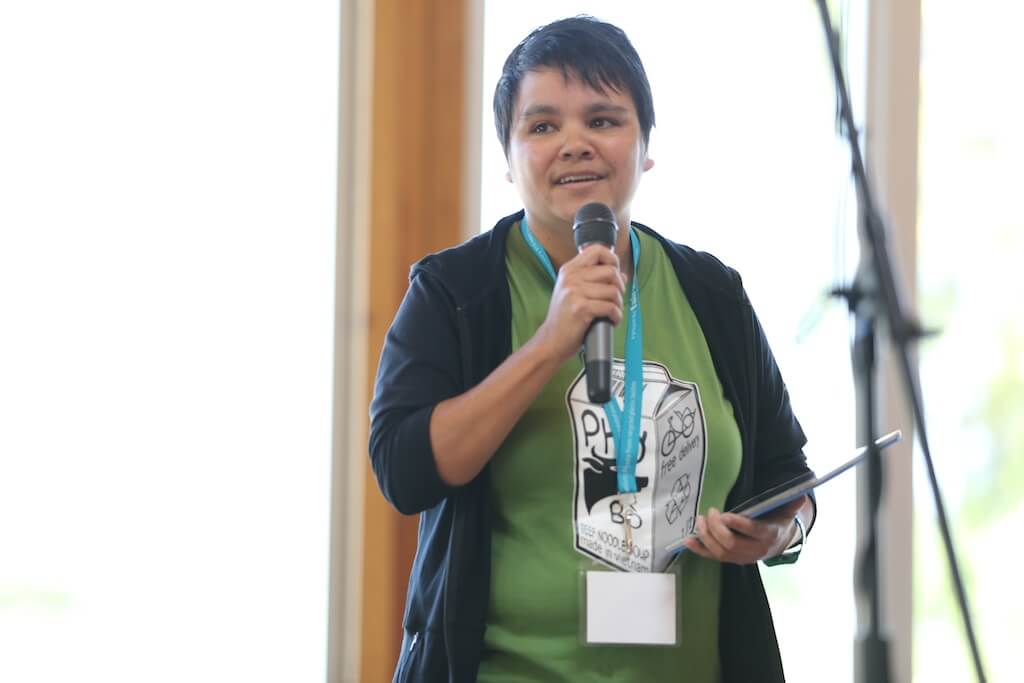On seeking, sharing and systems change

Note: This post originally appeared on the Social Innovation Generation (SiG) blog. It has been reposted here with permission.
If there’s one sentiment I have expressed a number of times over the past 2 weeks, it is gratitude. SiG and our partners have been metaphorically swimming in inspiring stories told by Canadian indigenous leaders and stories told of social lab interventions that are positively transforming lives in different parts of the world, while building relationships with a host of change-makers that are in equal measure genius and humble.
The only hard thing about all this goodness is choosing where to begin to make sense of all of the learning, translate the stories of successful change-making to a Canadian context, and offer some resources to adapt the best pieces of work.
Thanks to the kickoff event of Social Innovation Canada 2014 featuring Dana Shen, Director of Family by Family from South Australia, I feel confident in offering a place to start. SiG has taken a look at Family by Family before — as early as 2011 — courtesy of the co-designer of the model, Sarah Schulman of InWithForward. Hearing about it again from Dana meant a deeper dive into the model and hearing about its impact and adaptation over time.
Here is a quick summary of what Family by Family does; I’ll leave it to Dana herself to explain it in full on video:
In 2010, The Australia Centre for Social Innovation (TACSI) asked the South Australian government what they wanted to focus on in terms of better social service outcomes. The government asked for an intervention to bring down the high numbers of children in the formal protection system. TACSI, working with Sarah Schulman and Chris Vanstone, developed a peer-to-peer solution that looks astonishingly simple on the surface: families who have come through tough times mentor families experiencing tough times. Or in the words of Family by Family, sharing families mentor seeking families.
Watch Dana explain how getting to this solution was a learning experience in collaboration between unusual partners, in trust-building and in adaptation:
Following this MaRS Global Leadership presentation, Dana joined SiG and 160+ participants at SIX Vancouver, May 27-29, where we were privileged to hear an opening discussion between Dr. Frances Westley and Tyze Founder, Vickie Cammack. The conversation focused on the effects of culture on our spirits, our organizations and our society. In many ways I feel the key to Family by Family’s success was in taking the time to understand the culture it was entering – that of families experiencing difficult times and why change was so difficult to achieve.
The result of TACSI engaging with community in the design and prototyping of Family by Family was an equally deep impact on the so-called experts charged with delivering the program. Dana spoke to the benefits of Family by Family for the culture inside the public sector in South Australia, those delivering the program at Family by Family and the broader TACSI design team. So profound has been the impact, that TACSI and the government are looking for ways to scale the model.
During Frances and Vickie’s discussion, the conversation turned to a desire to understand resilience and vulnerability more deeply. Being open to exploring our own vulnerability also opens up opportunities to see and understand others. As Frances reflected, if you can’t touch the vulnerability in yourself, you can’t touch it in others either. And the result is that our fear of the “other” increases. We don’t have to look far to see fear guiding many interactions across cultures in the world.
Following the discussion, Dana reflected on our shared journey — on the fact that we are all in this world together; that we all want similar things. As Allyson Hewitt said at the end of Dana’s MaRS presentation, we are always sharing and seeking change. And it’s not a one-way street.
The Family by Family program has seen sharing families — those willing to volunteer time to support those experiencing tough times — become seeking families themselves. These times of vulnerability are to be expected and need not be permanent. As a community acting together and understanding each other more deeply, we can become more resilient. Vickie Cammack may refer to this as a recognition of our interdependence.
The Family by Family model is supporting a strengthening in community resilience. As seeking families achieve their goals, they increase their ability to share their experience and learning with others. At scale, the impact is a sea-change — this increased resilience enables the flow of resources, both personal and community, towards systemic change.
We all seek support and understanding at different times in our lives. Being awake to this is not to be stuck, but to be open to others.
In a second post about Social Innovation Canada 2014, I will explore what it means to know our own fears and desires better, as well as those of others with whom we experience conflict, thanks to the wonderful contribution of David Diamond at SIX Vancouver.
The ability to understand others through understanding ourselves is the result of a deepening empathy. SiG is so pleased to be co-presenting a conversation with Bill Drayton, Founder of Ashoka, on June 19th at MaRS. Bill has turned his extensive experience towards supporting and promoting entrepreneurs fostering empathy in our world. You can see details on that event here.